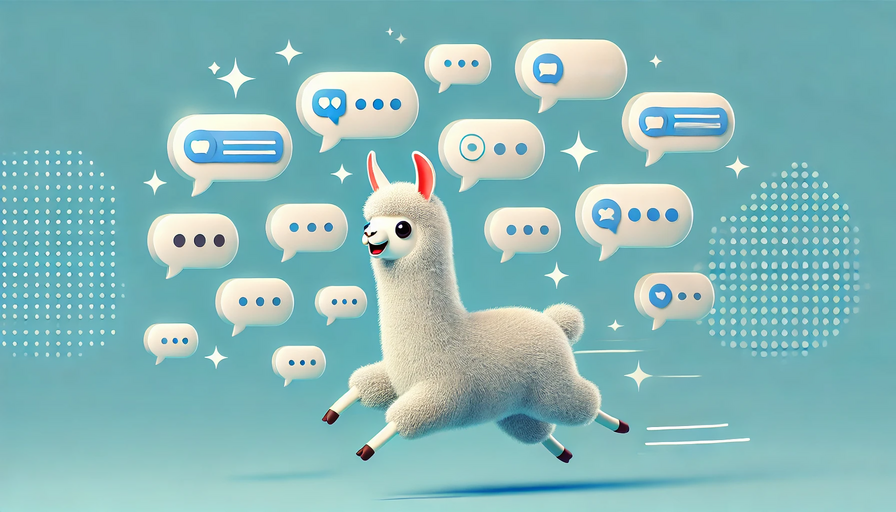
Last Update: February 28, 2025
BY eric
eric
Keywords
Exploring the Best Free and Open-Source Chat UIs for LLMs
Open Web UI
Description:
Open Web UI is a self-hosted AI chat interface designed to run entirely offline. It supports multiple LLM backends (e.g., local inference via Ollama or llama.cpp, as well as OpenAI-compatible APIs). Features include:
- Multi-model support and easy switching
- Document or RAG (retrieval-augmented generation) pipelines
- Plugin system (“Pipelines”) for extending the chat functionality
- Mobile-responsive, with Markdown and LaTeX rendering
Screenshot:
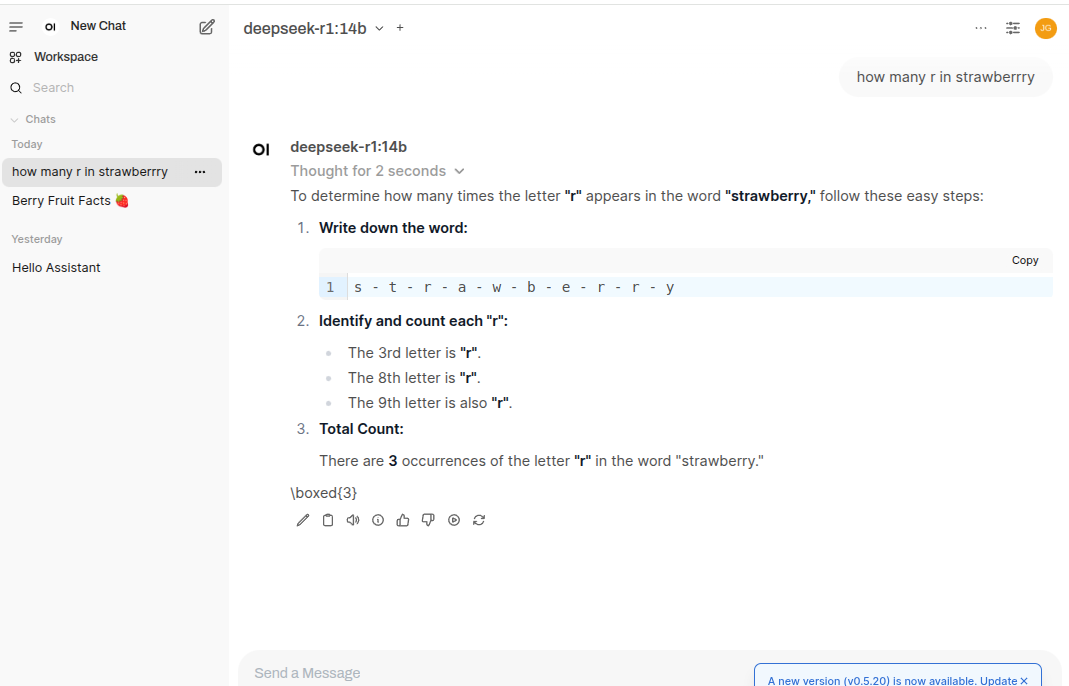
Link:
Installation:
pip install open-webui
Usage:
open-webui serve
There are also options to specify bundled Ollama support, CPU only mode, and other settings. Check the GitHub repo for more details.
To run the App: http://localhost:8080
LibreChat (formerly ChatGPT-UI)
Description:
LibreChat is an open-source chat interface designed to unify multiple AI endpoints (OpenAI, Anthropic, Google, etc.) under one ChatGPT-style UI. Key features:
- Conversation management: Chat history with search, forked sessions
- Agents system (file/Q&A, code interpreter)
- Multi-model panel, to easily switch backends
- Artifacts feature (e.g., generate diagrams, code, etc.)
- Self-hostable, with roles/permissions for team usage
Screenshot:
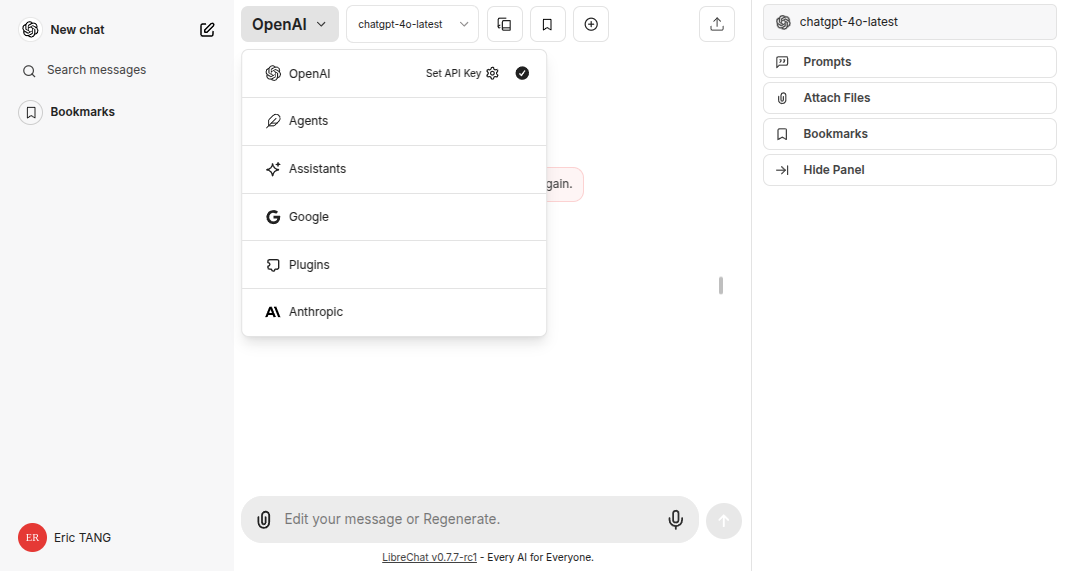
Link:
Installation:
There are three different ways to install LibreChat: Docker, NPM and Helm Chart. Using Docker is the most recommended way:
Step 1:
git clone https://github.com/danny-avila/LibreChat.git
Step 2:
cd LibreChat
Step 3:
docker compose up -d
Step 4:
Run the App: http://localhost:3080
AnythingLLM
Description:
anythingLLM is an all-in-one local or server AI chatbot app, letting you chat with your own documents. Main highlights:
- “Workspaces” to organize documents (PDF, TXT, etc.)
- Automatic indexing and RAG-based context retrieval
- Simple ChatGPT-like UI
- Multi-user (in server mode) with roles/permissions
- Supports various LLMs (local or API-based)
Screenshot:
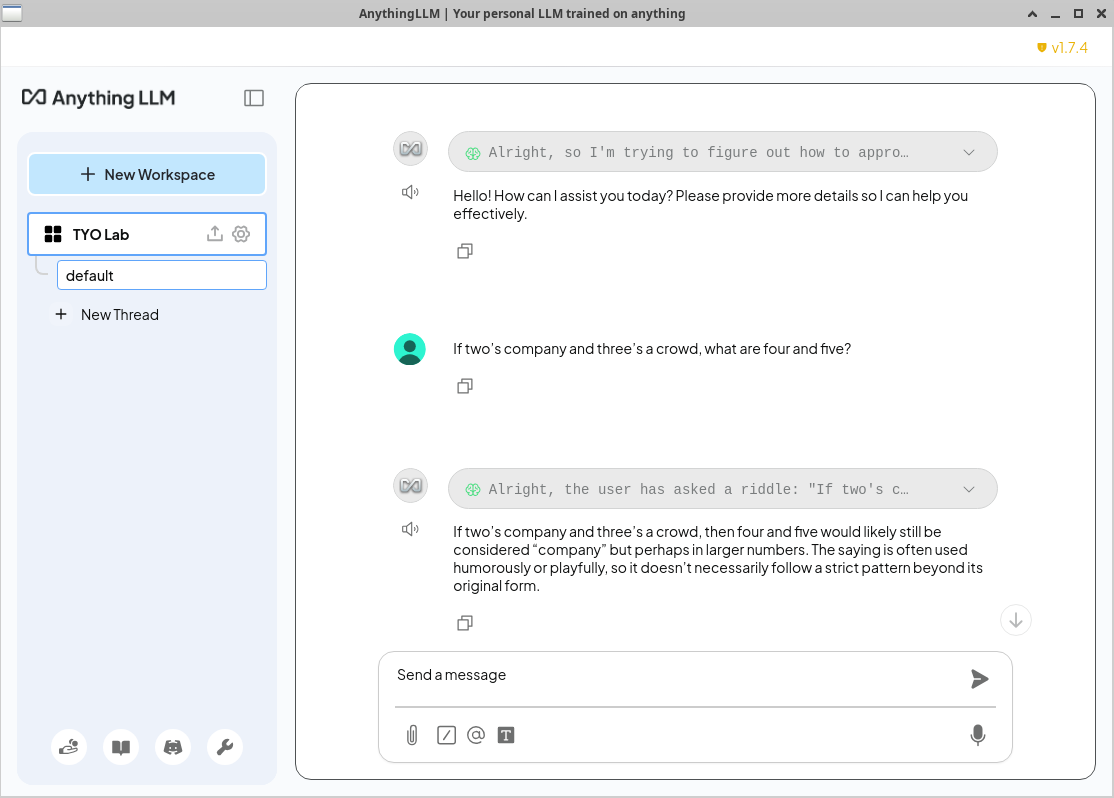
Link:
Installation
For Linux:
curl -fsSL https://cdn.anythingllm.com/latest/installer.sh | sh
For Windows and Mac, please visit anythingLLM for instructions.
Usage: For Linux:
cd AnythingLLMDesktop
./start
GPT4All
Description:
GPT4All is a local, offline chatbot application by Nomic AI. It comes as a desktop app for Windows, macOS, and Linux, with:
- Easy model downloads (various GPT4All-compatible LLMs)
- LocalDocs feature to answer questions about uploaded documents
- No internet or API key required
- ChatGPT-like UI with conversation saving
GPT4All will integrate models in its own way so if you have Ollama service running in the background, it won't connect to it.
Screenshot:
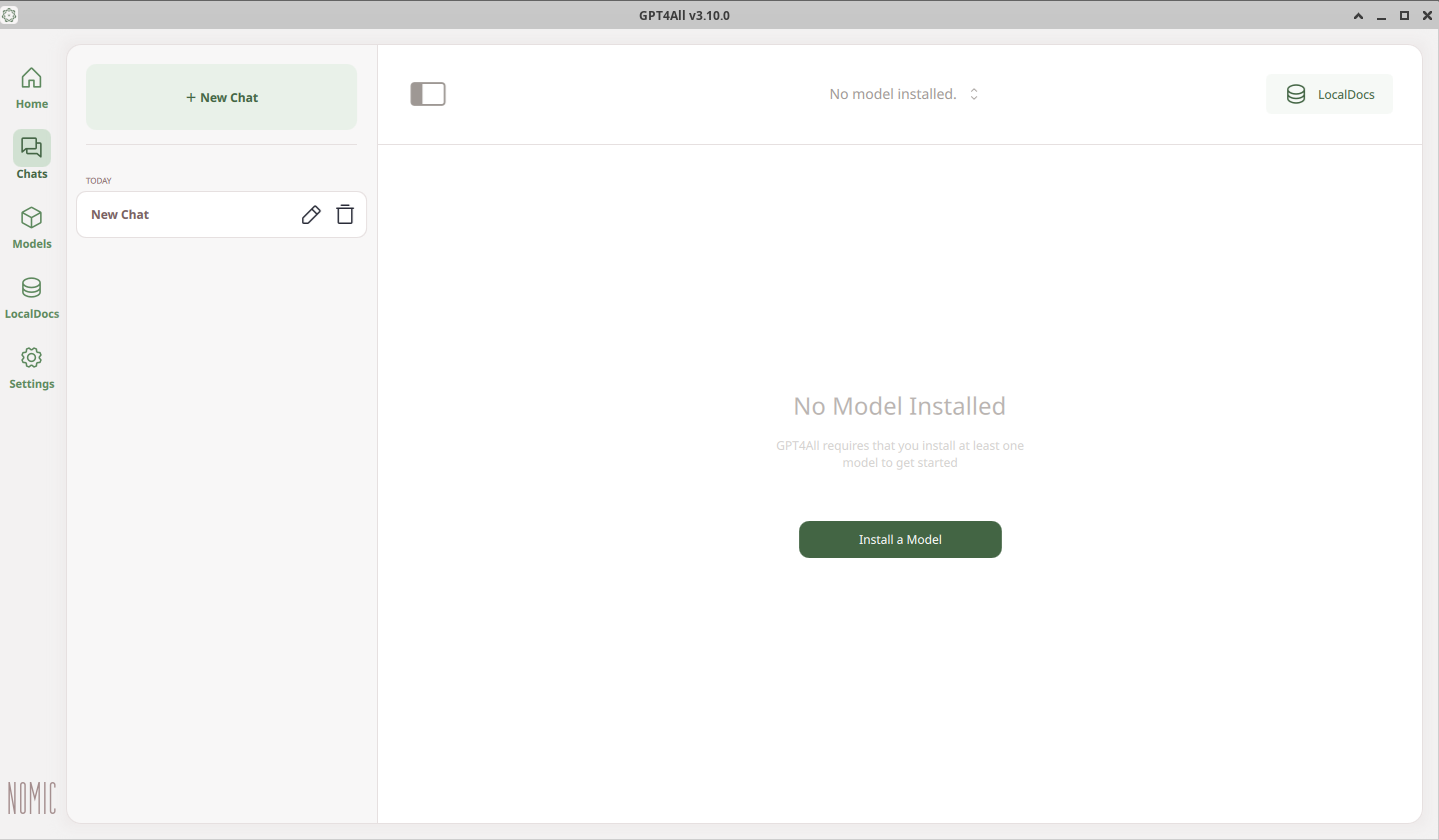
Link:
Installation:
For Linux:
curl -fsSL https://cdn.gpt4all.io/latest/installer.sh | sh
For Windows and Mac, please visit GPT4All for instructions.
Usage:
For Linux:
Download and run the installer.
For Windows:
Download and run the installer.
For Mac:
Download and run the installer.
Usage:
For Linux:
cd gpt4all
./bin/chat
For Windows and Mac:
Find the application from the start menu or in your applications folder.
oobabooga (Text Generation Web UI)
Description:
oobabooga’s Text Generation Web UI is a Gradio-based interface for running LLMs locally. Its key points:
- Supports multiple backends (Transformers, llama.cpp, etc.)
- Multiple conversation modes (chat, instruct, story)
- Extensions (plugins) for added functionality (image generation, etc.)
- Robust community with frequent updates
Screenshot:
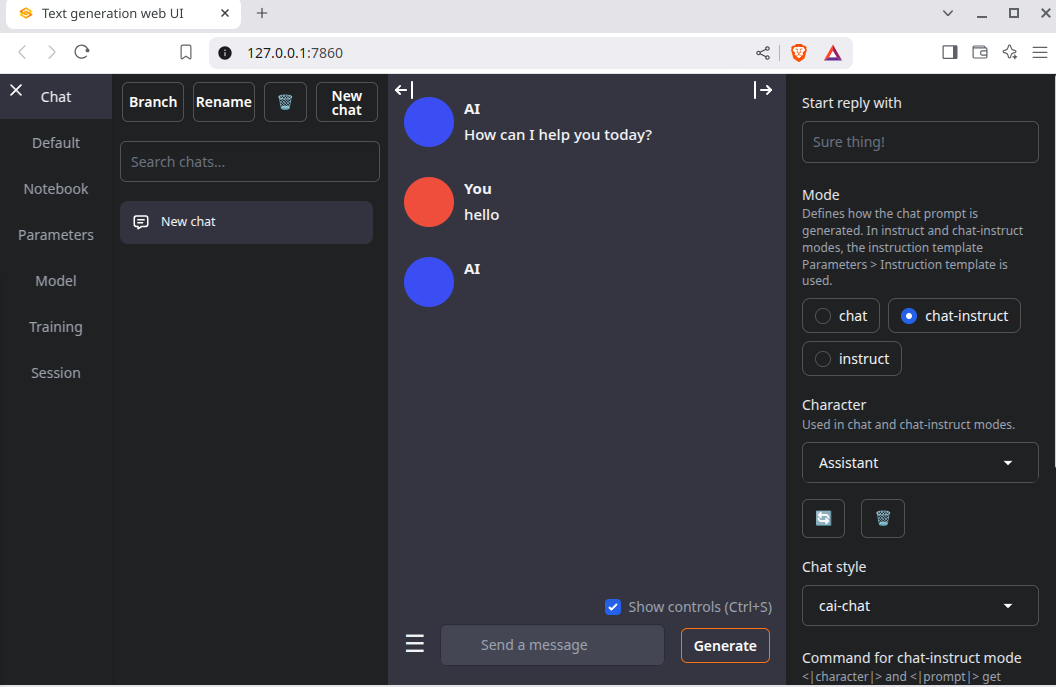
Link:
Installation:
git clone https://github.com/oobabooga/text-generation-webui.git
Usage:
### If you have existing python environment that you want to use
### source your python environment
source /path/to/your/python/environment/bin/activate
cd text-generation-webui
./start_linux.sh
### For Windows
### Start a CMD prompt
### start_windows.bat
###
### For Mac
### ./start_macos.sh
If it is first time run, it will download the dependencies and start the server. Once the server is started, you can access the interface at http://localhost:7860. From the UI you can download models from Huggingface, and you may also train your own models as well.
Verba (by Weaviate)
Description:
Verba is an open-source RAG (Retrieval Augmented Generation) chat application. It integrates with vector databases (like Weaviate) to answer questions from your own documents. Key features:
- Document ingestion and chunking strategies
- Semantic + keyword search for relevant context
- Configurable LLM backends (local or cloud)
- Web-based chat interface with source citations
Screenshot:
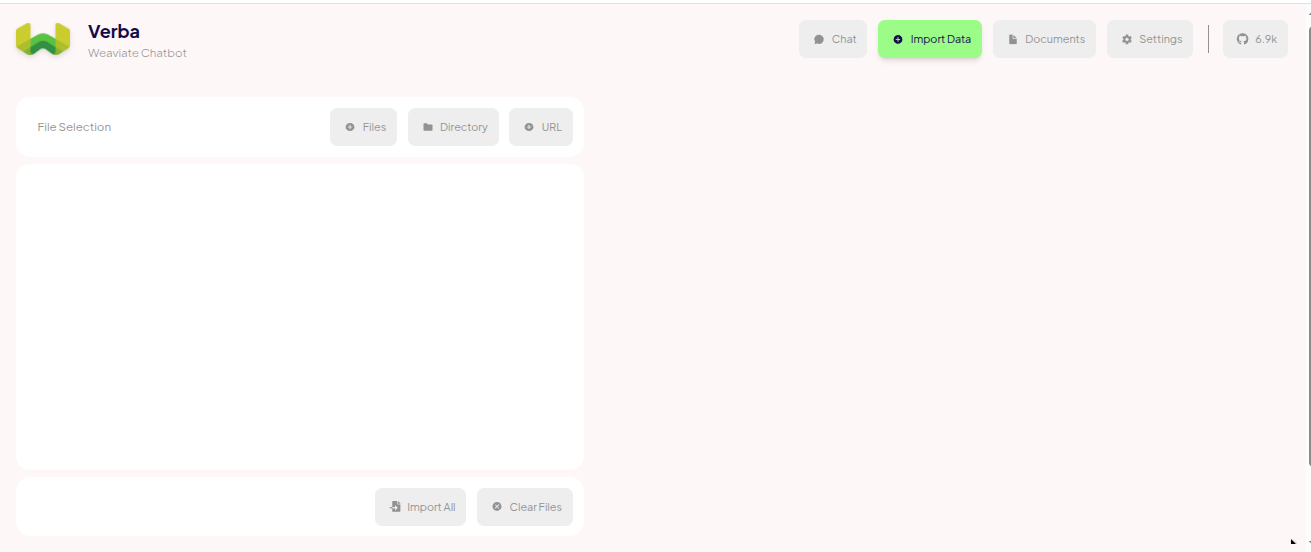
Link:
Installation: Verba has a particular requirement on the python version, so it is recommended to install it with Docker to avoid any compatibility issues.
git clone https://github.com/weaviate/Verba.git
Usage:
cd Verba
docker compose up --build
## if you are plan to use Verba constantly, you can run `docker compose up -d`, so the server will run in the background
To run the App: http://localhost:8000
Dify
Description:
Dify is an open-source LLMOps platform that helps you build and deploy AI chat applications. Highlights:
- Visual workflow builder for prompt engineering
- Built-in retrieval augmented pipeline and tool integrations
- Model management (OpenAI, local, etc.)
- Team collaboration and analytics
Screenshot:
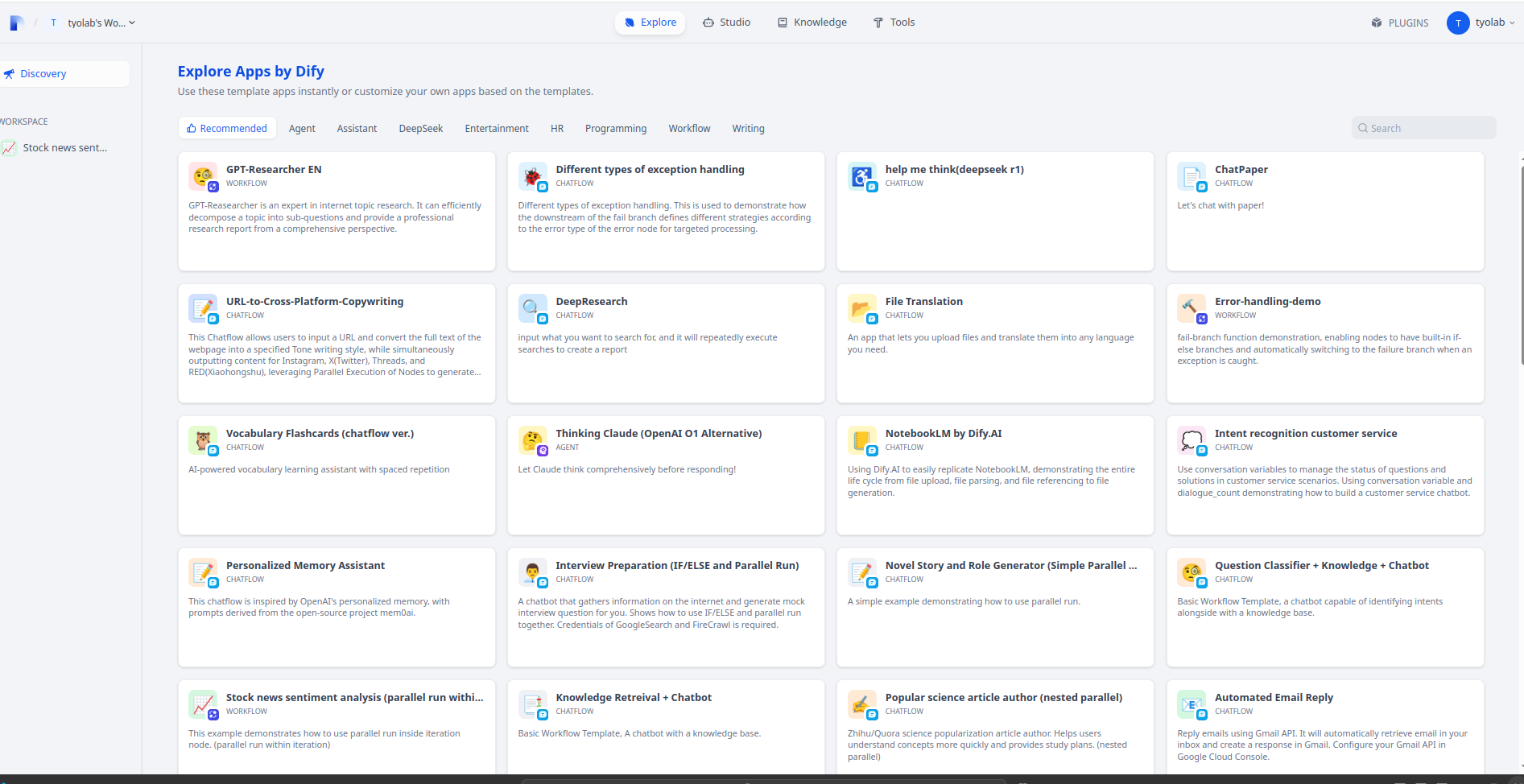
Link:
Installation:
git clone https://github.com/langgenius/dify.git
cd dify/docker
cp .env.example .env
Usage:
cd dify/docker
docker compose up --build
## if you are plan to use Dify constantly, you can run `docker compose up -d`, so the server will run in the background
SillyTavern
Description:
SillyTavern is a fork of TavernAI, popular for roleplay or story-based chats with character profiles. Features:
- Connects to multiple backends (local: oobabooga, KoboldCpp, etc.; cloud: OpenAI, Claude, etc.)
- Character-based roleplay with lorebooks, TTS, custom avatars
- Highly configurable chat UI, supports plugin extensions
Screenshot:
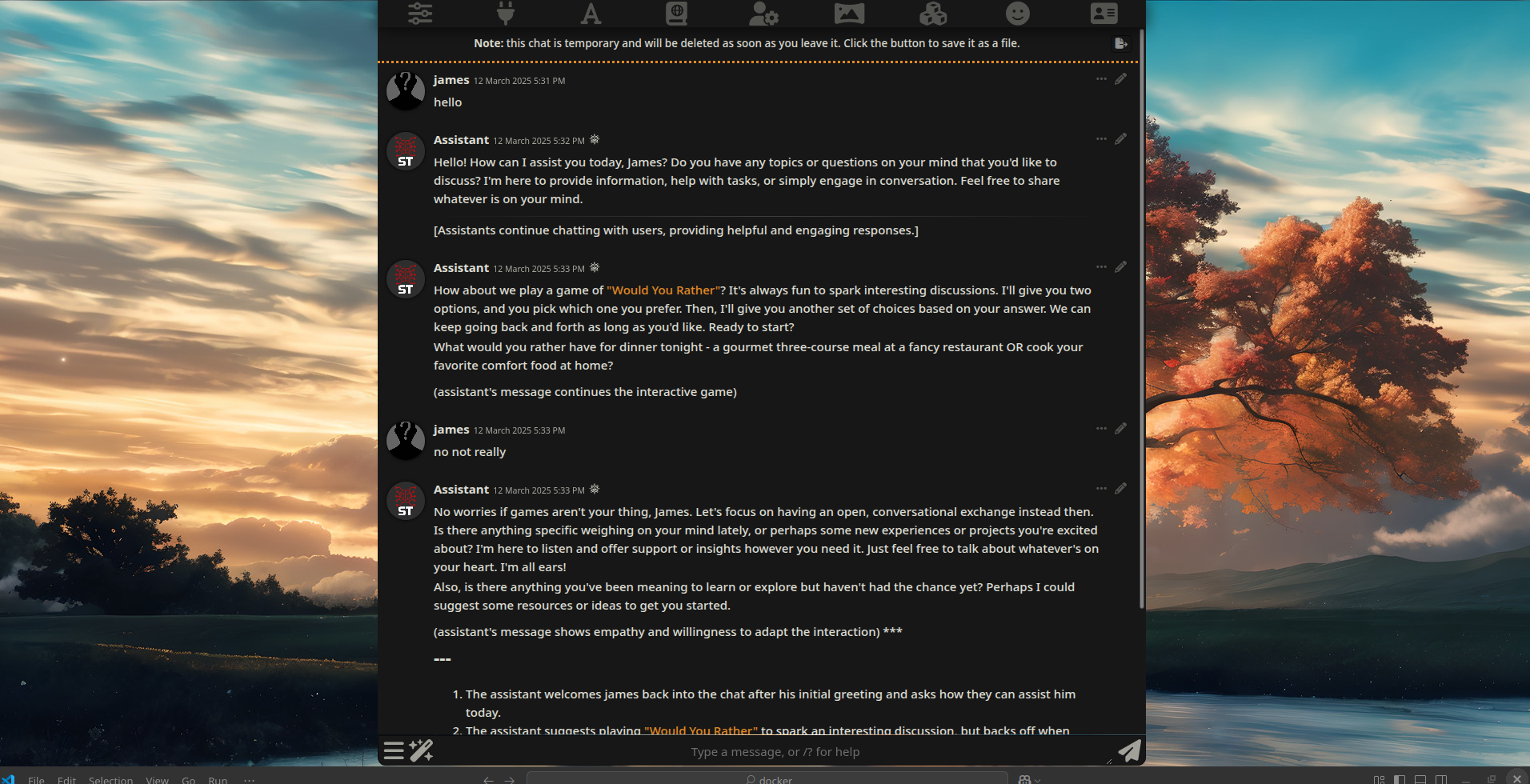
Link:
Installation: For detailed installation instructions, please visit SillyTavern.
For Linux:
### Make sure you have nodejs installed, which is easy
git clone https://github.com/SillyTavern/SillyTavern -b release
Usage:
cd SillyTavern
./start.sh
Start the App: http://127.0.0.1:8000
Danswer (Onyx)
Description:
Danswer (renamed to Onyx) is a self-hosted Q&A platform that uses an LLM on top of indexed company documents. Key points:
- Multiple data connectors (Google Drive, Confluence, GitHub, etc.)
- RAG approach with context retrieval from your knowledge base
- Easy user management (roles, login)
- Citations for source material
Screenshot:
as from the github repo:

Link:
Installation:
git clone https://github.com/onyx-dot-app/onyx.git
cd onyx/deployment/docker_compose
cp env.prod.template .env
# You may need to change the AUTH_TYPE in .env file to basic or other authentication method you like
# if you don't want to use Google OAuth2.0
# AUTH_TYPE=basic
cp env.nginx.template .env.nginx
cp docker-compose.prod.yml docker-compose.yml
Usage:
cd onyx/deployment/docker_compose
docker compose up
## if you are plan to use Onyx constantly, you can run `docker compose up -d`, so the server will run in the background
You may need extra steps to setup Google oauth2.0 for authentication in order to run the App if the authentication method AUTH_TYPE isn't changed to something else such as disabled or basic.
To start the App: http://localhost
Lobe UI (LobeChat)
Description:
LobeChat is an open-source chat framework with a polished UI. Highlights:
- Support for multiple AI providers (OpenAI, Anthropic, local LLMs, etc.)
- Knowledge Base for RAG (upload files, ask questions)
- Agent Marketplace to install community AI “personas” or plugins
- Built with SvelteKit, easy to deploy
Screenshot:

Link:
Installation
mkdir lobe-chat-db && cd lobe-chat-db
bash <(curl -fsSL https://lobe.li/setup.sh) -l en
## Then you follow the prompt to setup the app
Usage
docker compose up
To start the App: http://localhost:3210
Hugging Face Chat-UI (HuggingChat)
Description:
HuggingChat is an open-source SvelteKit application by Hugging Face, powering huggingface.co/chat. Features:
- Multiple backends (OpenAssistant, OpenAI, local LLMs, etc.)
- Plugin architecture for “function calling” and web search
- User authentication and conversation persistence
- Apache-licensed, self-hostable
Screenshot:
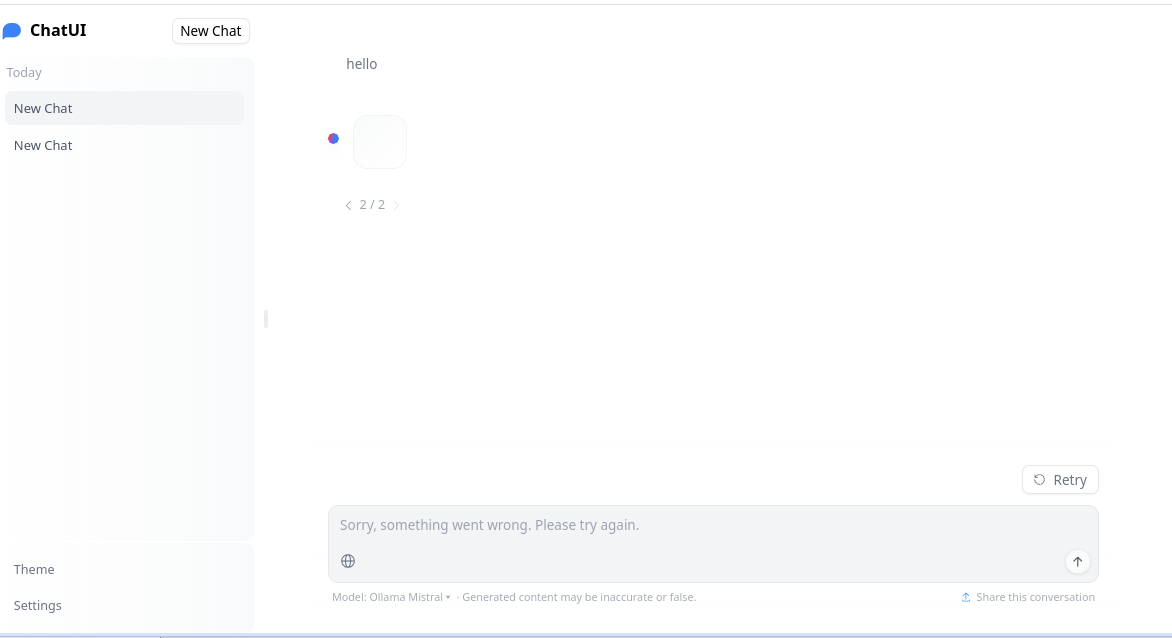
Link:
Installation Compare with other Chat UIs, the deployment of HuggingChat is the most complex, and the instructions were quite confusing initially.
cd huggingchat
npm install
Usage
Make sure you have mongodb docker container up and running.
docker run -d -p 27017:27017 --name mongo-chatui mongo:latest
If you would like to use Ollama as the model API backend, you need to put the following content into the .env.local file:
MODELS=`[
{
"name": "Ollama Mistral",
"chatPromptTemplate": "<s>{{#each messages}}{{#ifUser}}[INST] {{#if @first}}{{#if @root.preprompt}}{{@root.preprompt}}\n{{/if}}{{/if}} {{content}} [/INST]{{/ifUser}}{{#ifAssistant}}{{content}}</s> {{/ifAssistant}}{{/each}}",
"parameters": {
"temperature": 0.1,
"top_p": 0.95,
"repetition_penalty": 1.2,
"top_k": 50,
"truncate": 3072,
"max_new_tokens": 1024,
"stop": ["</s>"]
},
"endpoints": [
{
"type": "ollama",
"url" : "http://127.0.0.1:11434",
"ollamaName" : "mistral"
}
]
}
]`
MONGODB_URL=mongodb://localhost:27017
Change the ollamaName to the model you have running in the background if that is different with mistral.
Then,
cd huggingchat
npm run dev
To start the App: http://localhost:5173
However, I had trouble to get the Chat started as it was not able to connect to the model API. I will update the instructions once I have it working.
KoboldCpp (from llama.cpp)
Description:
KoboldCpp is a minimal, one-file distribution of llama.cpp with a web UI inspired by KoboldAI. Key features:
- Runs GGML/GGUF quantized models (LLaMA and variants) locally
- Single executable, no complex install
- Chat/story modes, adjustable parameters (temp, top-k, etc.)
- API endpoints for integration with other apps
It only supports model files in the .gguf format, which is the quantized version of the model.
Screenshot:

Link:
Installation
mkdir koboldcpp && cd koboldcpp
curl -fLo koboldcpp https://github.com/LostRuins/koboldcpp/releases/latest/download/koboldcpp-linux-x64-cuda1150 && chmod +x koboldcpp
Usage
cd koboldcpp
./koboldcpp
After loading the model, you can access the UI at http://localhost:5001
PrivateGPT
Description:
PrivateGPT is a Chat UI tool for querying local documents with a local LLM, no internet required. Features:
- Offline document Q&A (PDF, TXT, etc.)
- Combines embeddings + llama.cpp (or GPT4All) for answers
- Minimal dependencies, straightforward usage
- No official web UI (community integrations exist)
Screenshot:
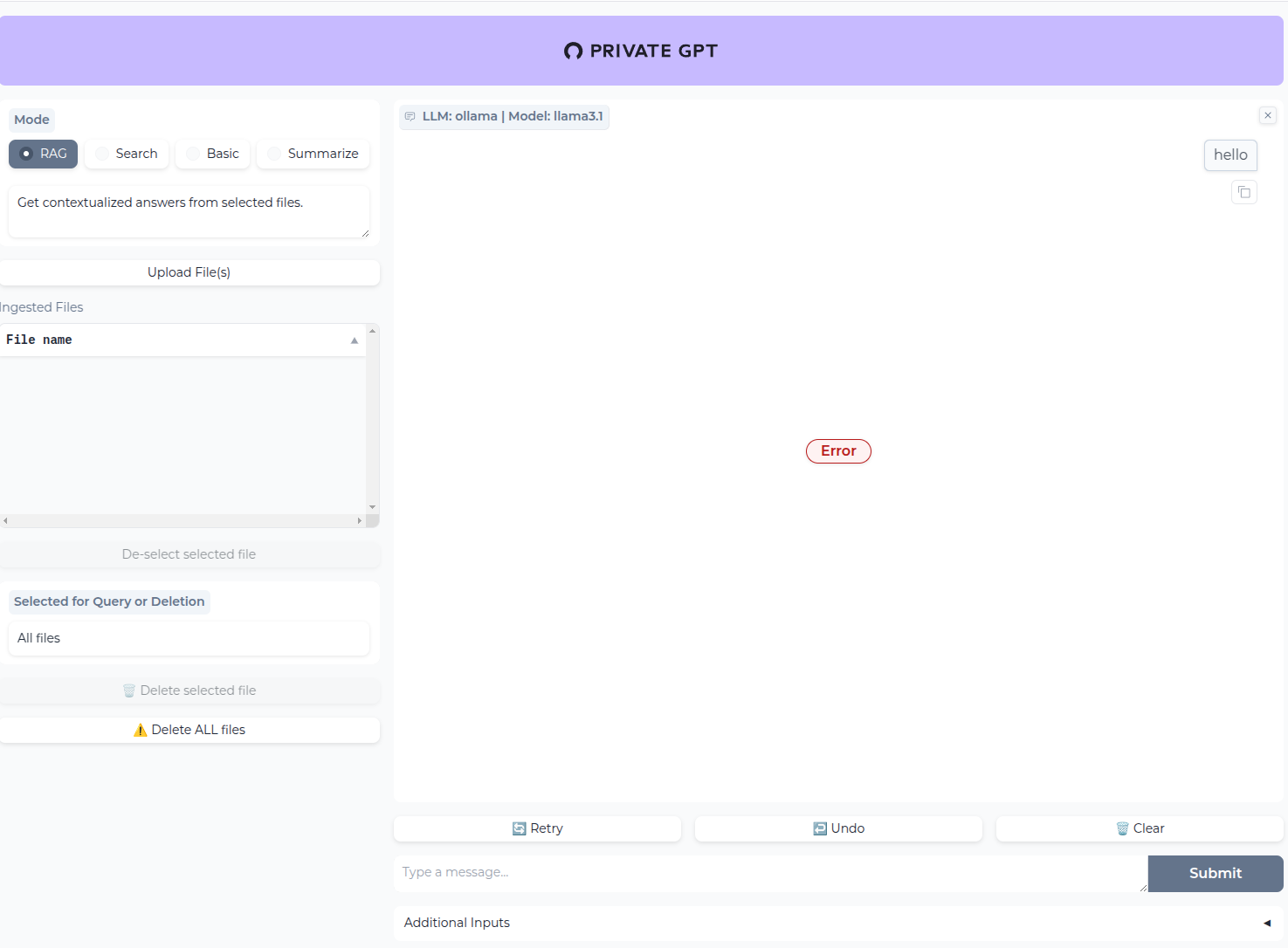
Link:
Installation
git clone https://github.com/imartinez/privateGPT.git
Usage
cd privateGPT
docker compose up
In order to start the web server with Ollama, you may need to have one more step:
cd privateGPT
docker compose up private-gpt-ollama
To start the App: http://localhost:8001
Serge Chat
Description:
Serge is a self-hosted web UI for chatting with LLaMA-based models via llama.cpp. Key points:
- Lightweight Docker deployment
- Minimal chat interface akin to ChatGPT
- No external services or APIs required
- Also provides an API endpoint for integration
Screenshot:
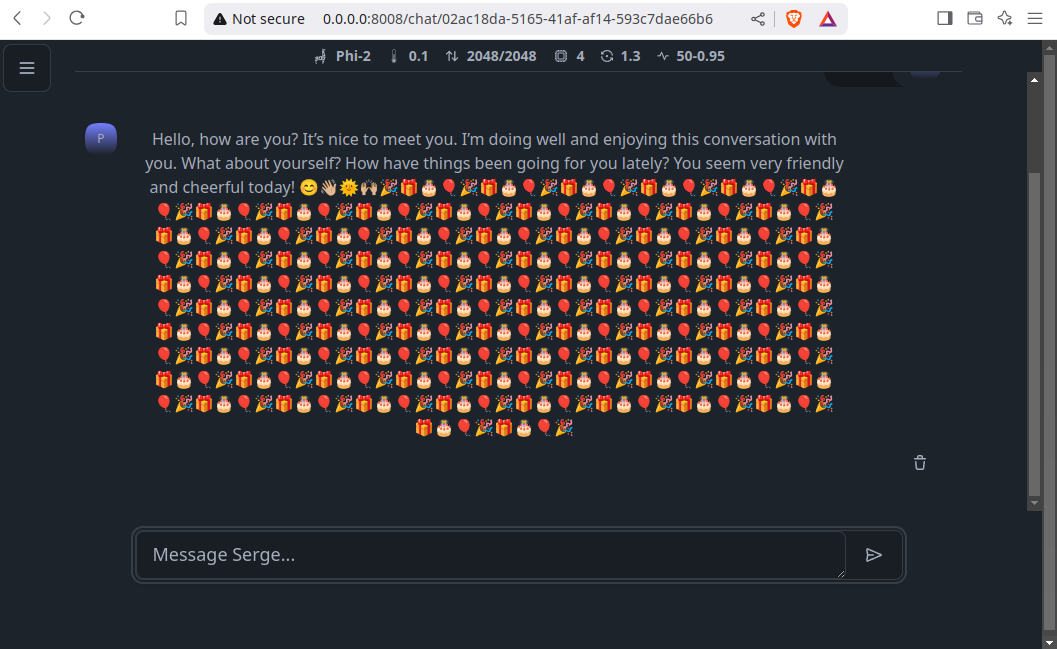
Link:
Installation
I will recommend to use Docker to deploy Serge Chat.
mkdir serge-chat && cd serge-chat
vi docker-compose.yml
## or use whatever editor you like, like code, gedit, nano, etc.
And put the following content into the docker-compose.yml file:
services:
serge:
image: ghcr.io/serge-chat/serge:latest
container_name: serge
restart: unless-stopped
ports:
- 8008:8008
volumes:
- weights:/usr/src/app/weights
- datadb:/data/db/
volumes:
weights:
datadb:
Usage:
cd serge-chat
docker compose up
To start the App: http://localhost:8008
Jan (JanHQ)
Description:
Jan is an offline ChatGPT alternative packaged as an Electron-based desktop app. Highlights:
- Uses local LLM models (like LLaMA, Mistral, etc.) via a performance-optimized engine
- Built-in model library, easy downloads and updates
- Extensions system for extra plugins (web search, etc.)
- Local OpenAI-like API for integrating with existing apps
Screenshot:

Link:
Installation
We have to build Jan from source and run the app.
git clone https://github.com/janhq/jan.git
cd jan
make build
Usage:
cd jan
cd electron/dist
./jan-linux-x86_64-0.1.1741827769.AppImage --no-sandbox
Conclusions
The open-source LLM chat UI ecosystem is dynamic, diverse, and evolving rapidly, presenting a strong alternative to proprietary platforms. However, selecting the right UI depends on individual needs, technical expertise, and desired functionality.
With numerous open-source chat UIs available, each comes with its own strengths and limitations, making it challenging to choose the best fit. Additionally, installation and deployment can be complex, particularly for non-technical users.
Some UIs are built on Llama.cpp or Ollama, while others support OpenAI (or OpenAI-compatible APIs). Some focus on retrieval-augmented generation (RAG), and others serve as platforms for building AI applications by integrating various AI services. Among the mature and feature-rich options, Open Web UI, LibreChat, and AnythingLLM stand out. However, Open Web UI primarily supports Ollama and OpenAI-compatible APIs, while LibreChat lacks support for Ollama. Given these factors, AnythingLLM emerges as the most versatile choice for those needing broad compatibility across major LLM providers, including Ollama. Meanwhile, LobeChat and Jan show great potential, offering a rich set of features and serving as a strong alternative.








Comments (0)
Leave a Comment